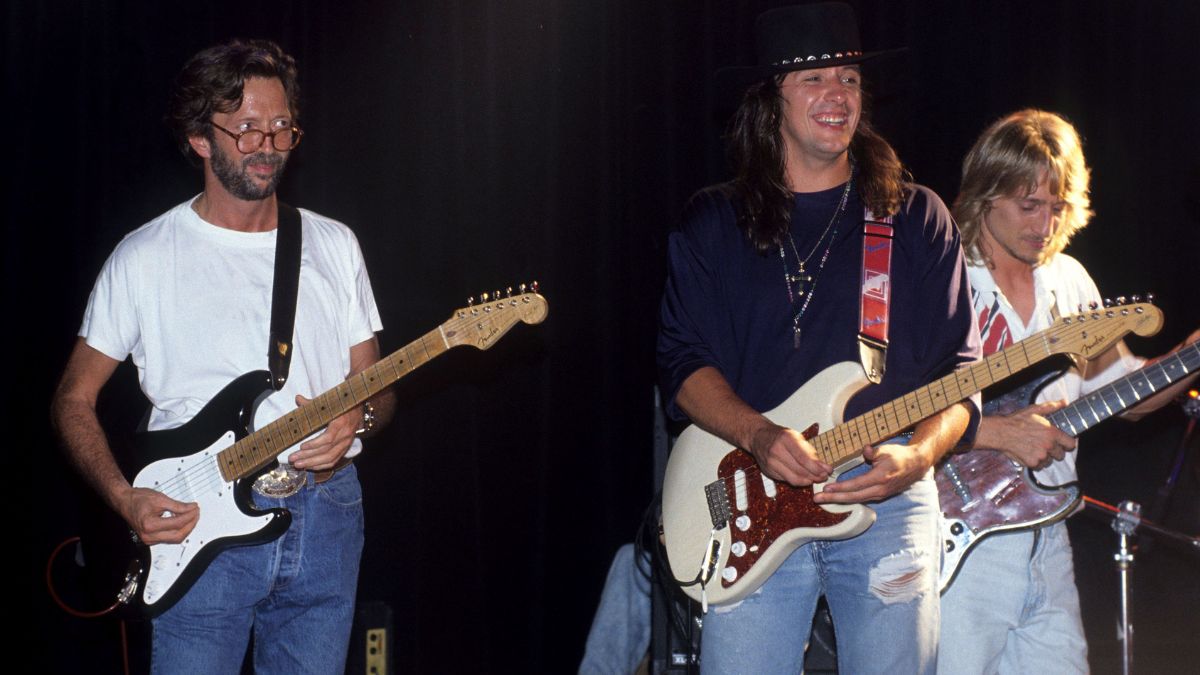“One day, Eric called and said, ‘Buddy Guy, George Harrison, and I are playing the Roxy tonight. You’re going to come and jam’”: The night Eric Clapton invited Richie Sambora to a dream jam session
The former Bon Jovi man opens up on being accepted by the blues community and his heroes, having cut his teeth playing the blues as a young, hopeful guitarist

All the latest guitar news, interviews, lessons, reviews, deals and more, direct to your inbox!
You are now subscribed
Your newsletter sign-up was successful
Richie Sambora, to the more casual listener, may be known as the Talk Box guy behind Bon Jovi’s mega-hit-cum-wedding-party-anthem Livin' on a Prayer, but beyond that is a deep-set love for the blues.
He started playing guitar at 12, idolizing the likes of B.B. King, Jimmy Page, and Eric Clapton. Later on in life, they'd become far more than heroes.
He'd go on to enjoy a strong relationship with King; Jimmy Page signed his early band, Mercy, to Led Zeppelin's Swan Song record label; and in 1995, Eric Clapton, ordered him to join a dream jam session at the Roxy. There was no asking.
Speaking in the latest issue of Guitar Player, Sambora charts his career with candid anecdotes about life after Bon Jovi. More importantly, he also discussed being accepted by the blues community, and the moment Slowhand delivered a poetic full-circle moment to him.
“In 1991, when I was finishing up Strange in This Town, I wrote a song, Mr. Bluesman, about a young man like me following blues guys around,” he remembers. “I asked Eric if he would play on it, and he obliged.
“One day [in March, 1995] he called me and said, 'Richard, this is Eric...' I'm like [drops his mouth in amazement] because I'm still crazy and starstruck. He says 'Buddy, George [Harrison] and I are playing the Roxy tonight. You're going to come and jam.'
“I'm like 'No, I'm watching the fucking Price Is Right, Eric?! … I will be there, I promise you!' Meanwhile, I'm shitting my pants.”
All the latest guitar news, interviews, lessons, reviews, deals and more, direct to your inbox!
Strangely, Harrison “didn’t show up”, with John Lee Hooker present instead, perhaps as a last-minute replacement as one of many legendary names in Clapton’s address book.
“I played every lick I knew about three times faster – whatever I had to do to get through the whole thing,” Sambora continues. “Buddy's like 'Come on, come on!' and Eric's just laughing.
“We blew the roof off the place, and we were backstage at the end. Hooker looked at me and said, 'Hey boy, was that you playing them strings up there?... You keep playing. You're good.' I got on my knees and kissed his hand.”
It’s no doubt a moment that lives rent-free in Sambora’s mind. As he goes on to say, his own address book started filling out, and idols turned into peers and mentors.
I was accepted by the blues community. But I did the work, man. I did the stuff.
Richie Sambora
“Every time Buddy was around or I was anywhere near the vicinity,” he concludes, “we'd just call each other. B.B. was the same way. I was accepted by the blues community. But I did the work, man. I did the stuff. I played blues clubs for a reason and I loved every second of it.”
Sambora released four new singles in 2024, his first new solo music since 2012’s Aftermath of the Lowdown.
I Pray, Livin' Alone, Songs That Wrote My Life, and Believe (In Miracles) were released across consecutive weeks in April and May.
Sambora left Bon Jovi in 2016 to have more time to spend with his family. You can read about his recent reflections on his departure from the band here.
Head to Magazines Direct to pick up the latest issue of Guitar Player, which includes the full interview with Sambora, alongside discussions with John Fogerty, Sue Foley, Thorn Florentine Empirial.
A freelance writer with a penchant for music that gets weird, Phil is a regular contributor to Prog, Guitar World, and Total Guitar magazines and is especially keen on shining a light on unknown artists. Outside of the journalism realm, you can find him writing angular riffs in progressive metal band, Prognosis, in which he slings an 8-string Strandberg Boden Original, churning that low string through a variety of tunings. He's also a published author and is currently penning his debut novel which chucks fantasy, mythology and humanity into a great big melting pot.


